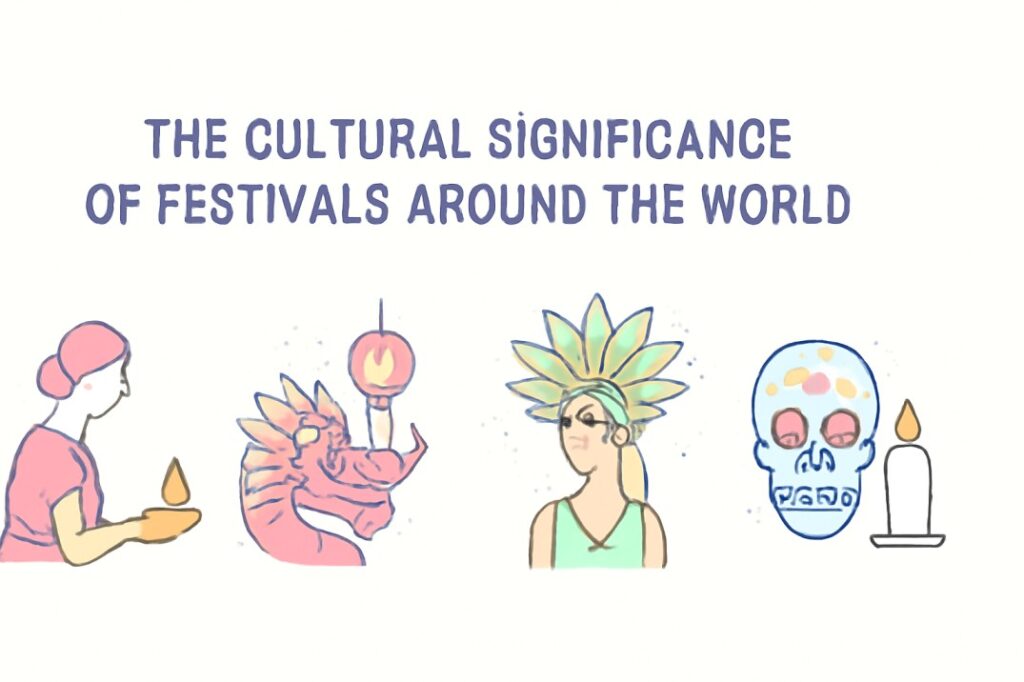Festivals have been an integral part of human history and culture for thousands of years. They serve as an opportunity to celebrate significant events, express collective identity, and bring communities together. Festivals, whether they are religious, seasonal, or cultural, play a crucial role in shaping and preserving the traditions and values of societies. These events not only allow individuals to reflect on their history but also create a shared sense of belonging and togetherness.
In a globalized world, where people from various cultures interact, festivals act as bridges of communication and understanding. They give us the opportunity to learn from one another, celebrate diversity, and understand the deep cultural and spiritual meanings behind these celebrations. Across different continents, festivals take various forms, from grand public displays to intimate family gatherings, yet they all serve as a means of marking the passage of time and celebrating life’s milestones.
1. Preserving and Celebrating Tradition
One of the primary reasons for celebrating festivals is to preserve and honor cultural traditions. Many festivals have roots that go back centuries, and through them, ancient customs, stories, and rituals are passed down to new generations. These traditions help to preserve the unique character of cultures while also reinforcing the importance of family and community bonds.
Chinese New Year is a perfect example of a festival deeply rooted in tradition. The festivities celebrate the start of the lunar calendar year and honor ancestors, with people gathering for large family meals, offering prayers to deities, and giving red envelopes filled with money to children for good luck. The Chinese New Year also has a significant emphasis on symbols such as the color red, fireworks, and the lion and dragon dances, which are thought to drive away evil spirits and bring good fortune for the coming year.
Similarly, the Diwali festival in India has an ancient history, symbolizing the victory of light over darkness and good over evil. It is a time for families to come together, light oil lamps (diyas), burst fireworks, and share sweets. The religious significance of Diwali is intertwined with the seasonal harvest and the marking of the new moon, but it is also a celebration of community and harmony. The customs and practices followed during Diwali reinforce values of hospitality, generosity, and togetherness.
Day of the Dead (Día de los Muertos) is a Mexican festival that blends Catholic traditions with indigenous customs. Held to honor deceased ancestors, this festival includes creating altars, decorating them with marigolds, sugar skulls, and other offerings, as well as the lighting of candles. It is a time for families to remember their loved ones, and it reflects the Mexican belief in the cyclical nature of life and death, where the deceased continue to live in spirit among their families.
2. Festivals and Community Building
Festivals have the power to strengthen communities and bring people together. They offer an opportunity for individuals to set aside differences and unite around a common cause or celebration. Whether it’s a religious observance, a national holiday, or a local festivity, festivals create a sense of belonging, pride, and social cohesion.
Oktoberfest, held annually in Munich, Germany, is one of the world’s largest and most famous beer festivals. What started as a royal wedding celebration in the early 19th century has evolved into an international event that attracts millions of visitors from around the globe. Oktoberfest has become more than just a beer festival; it is a celebration of Bavarian culture, with traditional foods like pretzels and sausages, folk music, and, of course, beer. The festival fosters a sense of camaraderie and unity as people from different backgrounds come together to share in the festivities.
Diwali in India is another festival that unites communities. Despite being a religious festival, Diwali is celebrated by people from various backgrounds, including Hindus, Sikhs, Jains, and Buddhists. The festival fosters harmony and goodwill, and during this time, people exchange gifts, visit each other’s homes, and participate in community prayers and celebrations. Diwali transcends religious boundaries, emphasizing the universal themes of light, hope, and renewal.
3. Spiritual and Religious Significance
For many people, festivals are deeply spiritual and provide an opportunity to reconnect with their faith. Religious festivals are a way to commemorate important events in a religion’s history, honor deities, or mark seasonal transitions that have religious significance.
Ramadan, observed by Muslims around the world, is one of the holiest months in Islam. During Ramadan, Muslims fast from dawn to dusk, engaging in self-reflection, prayer, and charitable acts. The fast is meant to purify the soul and foster empathy for the less fortunate. Ramadan culminates in the festival of Eid al-Fitr, a joyous occasion marked by family gatherings, prayers, feasts, and the giving of gifts. Eid symbolizes gratitude, forgiveness, and the celebration of spiritual growth.
Holi is another festival that combines religious and spiritual significance. It is celebrated by Hindus, marking the arrival of spring and the victory of good over evil. Holi is a festival of colors, where people throw colored powders at each other, dance, sing, and celebrate with friends and family. It signifies the breaking of social barriers, the renewal of relationships, and the celebration of life’s vibrancy.
4. Festivals as an Expression of Cultural Identity
Festivals are often an expression of cultural pride and identity. They serve as a way to celebrate and preserve the uniqueness of a community’s traditions, art, music, and customs. Through festivals, people can assert their cultural identity and showcase the richness of their heritage to the world.
Carnival in Brazil is perhaps the most globally recognized expression of cultural identity. The festival is a celebration of Brazilian culture, featuring vibrant parades, samba music, elaborate costumes, and street parties. Carnival has its roots in both indigenous and African traditions and is a celebration of Brazil’s diversity. It is a time to let go of inhibitions, dance in the streets, and express the joy of life.
Chinese New Year also reflects a sense of cultural identity, where the festival is a reflection of Chinese values such as family, respect for ancestors, and hope for prosperity in the new year. Chinese communities around the world celebrate this festival, from large-scale parades with dragon dances to intimate family dinners.
5. The Role of Festivals in Economic Development
Festivals are not only important for their cultural and social value, but they also have significant economic impact. Festivals attract tourists, create business opportunities, and generate revenue for local economies. They often serve as an important tool for boosting the local economy, especially in regions that rely on tourism.
The Edinburgh Festival Fringe is a prime example of how festivals can stimulate economic growth. As the world’s largest arts festival, it brings in thousands of performers, spectators, and tourists to Scotland each year, contributing millions of pounds to the local economy. The festival also provides a platform for local artists to showcase their talent and gain international recognition.
La Tomatina in Spain is another festival that has turned into a major tourist attraction. This world-famous tomato-throwing festival generates significant economic benefits for the town of Buñol, with visitors from all over the world coming to participate. The festival boosts local businesses, hotels, and restaurants, providing a substantial source of income for the region.
Conclusion
Festivals are an essential part of human culture, offering an opportunity to celebrate life, honor traditions, and foster community spirit. From ancient customs to modern-day celebrations, festivals continue to play a vital role in shaping our identities, connecting us to our heritage, and bringing people together. In a world that is becoming increasingly interconnected, festivals provide a way to celebrate diversity, understand different cultures, and build shared experiences that transcend borders. They serve as a reminder of the importance of cultural preservation, community bonding, and the universal need for joy and celebration in our lives.

